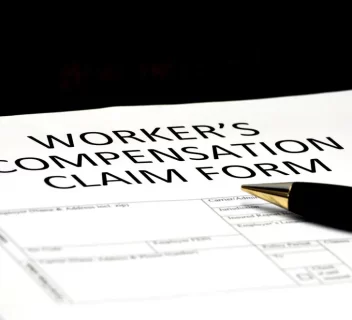When Will Workers Comp Offer a Settlement? Key Factors and Timelines Explained
If you’re asking, ‘When will workers comp offer a settlement?’ in your workers’ comp case, the answer typically hinges on your reaching Maximum Medical Improvement (MMI). Factors like injury severity, medical treatment needs, and any legal disputes also play a role. In this article, we break down these factors so you can understand and anticipate when a settlement offer might come.
Key Takeaways
- Workers’ compensation settlements expedite financial support for injured workers, covering medical expenses and lost wages, either as a lump sum or structured payments.
- Settlement offers are influenced by factors such as the injury’s severity, the worker’s medical condition, and legal disputes within the workers’ comp claim; they typically arise after maximum medical improvement is reached.
- Evaluating the fairness of a settlement involves assessing future medical expenses and lost wages, with legal advice crucial to ensure comprehensive compensation.
Understanding Workers’ Compensation Settlements
Workers’ compensation settlements are arrangements made between injured workers and insurance companies to provide financial remuneration for injuries sustained on the job. The workers’ compensation insurance company plays a crucial role in managing these settlements and determining the financial remuneration for injuries sustained on the job. The purpose of these workers comp settlements is to take care of medical bills and compensate for wages lost due to inability to work, among other related expenses. This process aims to circumvent court cases while ensuring that injured employees obtain the necessary monetary aid without having to resort to legal action. Such agreements can come as a one-off lump sum payment given all at once or as structured payouts spread over an agreed period.
Before agreeing to any settlement proposal from the insurance company, it’s critical for affected individuals to assess potential disadvantages such as forfeiting future claims linked with their workplace injury. Insurance firms often opt in favor of offering a settlement because it helps them manage risks better by limiting long-term liabilities thus presenting benefits under certain circumstances.
Awareness about how and when these offers arise empowers employees who have suffered from work-related harm in making well-rounded choices regarding whether they should accept proposed settlement terms.
What is a Workers Comp Settlement?
A workers’ compensation settlement is a lump sum payment offered by the insurance company to resolve a workers’ compensation claim. This settlement amount is typically calculated based on the anticipated costs to the insurance company rather than the injured worker’s actual needs. The primary goal for the insurance company in offering a settlement is to avoid the ongoing costs associated with future medical expenses and lost wages.
When an injured worker accepts a settlement offer, they essentially agree to take responsibility for any future medical expenses and lost wages related to their injury. This means that while the lump sum payment can provide immediate financial relief, it also requires careful consideration of long-term medical and financial needs. Understanding the full implications of accepting a workers’ compensation settlement is crucial for making an informed decision.
Factors Influencing When Will Workers’ Comp Offer a Settlement
Several factors influence when a workers’ compensation settlement offer might be made in a workers comp claim. These include the nature and severity of the work injury, the injured worker’s medical condition, and any legal disputes related to the claim. Often, settlements are more likely in cases involving permanent impairment or disputes over the injury or benefits.
Insurance companies often aim to settle claims before the injured worker reaches maximum medical improvement (MMI) to mitigate future costs. Delays in settlements can occur due to ongoing negotiations, unresolved medical issues, or disputes concerning benefits.
Being aware of these factors can help injured workers anticipate and prepare for a settlement offer.
Reaching Maximum Medical Improvement (MMI)
The attainment of Maximum Medical Improvement (MMI) is a crucial point in the workers’ compensation journey. This phase indicates that an injured worker’s health has reached a level where medical intervention is not expected to produce substantial improvements. At this juncture, individuals may qualify for Impairment Income Benefits (IIB), forming part of their compensatory entitlements. Settlement offers from workers’ compensation insurance adjusters occur post-MMI or amid the appeal proceedings.
Nevertheless, arriving at MMI doesn’t automatically result in a settlement proposal since disputes over injury severity or treatment adequacy can still surface. The gravity of the injuries along with assessments related to long-term disabilities can affect when an offer might be made subsequent to reaching MMI.
Insurance companies often opt to resolve claims prior to claimants achieving MMI as a strategic move to curb prospective future expenses associated with the medical condition and recovery process, a common practice for a workers’ compensation insurance company.
Severity of Injury and Medical Treatment
The gravity of an injury, along with the expected duration of recuperation, are critical factors that influence when a settlement offer may be presented in a workers comp case. Injuries necessitating significant medical treatments and extended periods for recovery can result in escalating medical costs and the need for continuous care. Insurance companies concerned about claim expenses might propose a settlement prior to achieving Maximum Medical Improvement (MMI) due to these financial considerations.
Workers who have sustained serious injuries or require intricate medical procedures may find that there is a delay in receiving settlement offers while insurance companies evaluate the totality of their medical requirements and projected future costs. Understanding how injury severity and requisite medical treatments affect this process can enable injured workers to more accurately predict when they might receive settlement proposals from insurance firms.
Disputes and Legal Proceedings
Insurance companies frequently reassess their position on settling claims when faced with disputes regarding the degree of injuries or the calculation of benefits in a workers comp claim, often leading to consideration of settlement offers. Insurance company defenses are a typical reason for refusing a workers’ compensation claim.
As trial dates loom, mediation sessions become instrumental in resolving disputes and may result in settlement offers being made. Engaging an experienced lawyer can be vital if you face a denial of your workers’ compensation claim. They can guide you through the appeals process and help secure a fair settlement. It is possible that settlement offers may be presented during an appeal against a rejected claim.
Employee Factors
Several employee factors can significantly influence the likelihood of receiving a workers’ compensation settlement. These include:
- Severity and Permanence of the Injury: More severe and permanent injuries often lead to higher settlement offers due to the long-term impact on the worker’s life and ability to work.
- Impact on Job Performance: If the injury affects the worker’s ability to perform their job, this can increase the likelihood of a settlement as it underscores the need for compensation.
- Cost of Ongoing Medical Care: High medical expenses and the need for continuous treatment can prompt insurance companies to offer a settlement to avoid future costs.
- Future Medical Expenses and Lost Wages: The potential for ongoing medical expenses and lost wages plays a critical role in settlement negotiations.
- Worker’s Age and Overall Health: Younger workers or those in good health may receive different settlement considerations compared to older workers or those with pre-existing conditions.
Injured workers who are represented by experienced workers’ compensation attorneys are more likely to receive settlement offers. These attorneys can effectively negotiate on behalf of the worker, ensuring that all future medical needs and lost wages are adequately considered. Additionally, workers who have reached Maximum Medical Improvement (MMI) and have a clear understanding of their future medical needs are in a stronger position to receive and evaluate settlement offers.
Employer Factors
Employer factors can also significantly influence the likelihood of a workers’ compensation settlement. These include:
- Insurance Company and Settlement Policies: The employer’s insurance company and their specific policies regarding settlements can impact the timing and amount of settlement offers.
- Employer-Worker Relationship: A positive relationship between the employer and the injured worker can facilitate smoother negotiations and quicker settlements.
- Desire for Quick Resolution: Employers who wish to resolve claims quickly and efficiently may be more inclined to support settlement offers.
- Business Impact Concerns: Employers concerned about the impact of the claim on their business operations and insurance premiums may prefer to settle claims to mitigate long-term costs.
Employers who proactively manage their workers’ compensation claims and maintain open communication with their injured workers are more likely to resolve claims through settlement. This approach not only helps in reaching a fair settlement but also fosters a supportive environment for the injured worker’s recovery.
When to Expect a Workers’ Comp Settlement Offer

Typically, it takes about one to one and a half years from the moment an injured worker files for workers’ compensation to when they receive an offer of settlement. During mediation sessions, a workers’ compensation insurance company often proposes a settlement once the employee has achieved Maximum Medical Improvement (MMI) and prior to the case proceeding to trial. A majority of these claims are settled following the stabilization of the worker’s medical condition.
Offers for settlements are commonly made at pivotal moments within the claims process, as this is when both parties have a clearer understanding of what might result from ongoing proceedings. Understanding when such offers tendentially occur can assist injured employees in better orchestrating their financial plans and healthcare needs moving forward.
After Medical Stabilization
It is essential to reach a point of medical stabilization, where the condition of an injured worker has stabilized before assessing settlement evaluations in a workers comp claim. Typically, settlement offers are extended once medical treatment concludes or when Maximum Medical Improvement (MMI) is attained. To settle claims and circumvent potential future expenses, insurance adjusters frequently put forth a workers’ compensation settlement after the completion of medical care.
Taking a workers’ compensation settlement can bring about certainty and diminish the uncertainties associated with legal proceedings. It enables those who have sustained injuries on the job to concentrate on recuperating without being weighed down by ongoing legal disputes while carefully considering any prospective workers comp offer that might emerge.
During Mediation or Before Trial
As the trial date approaches, a workers’ compensation insurance company often reconsiders its position on claim settlements. Mediation sessions provide an opportunity for both sides to engage in negotiations with the aim of reaching a settlement prior to going to court. This process can not only prevent escalated litigation expenses but also potentially result in a more beneficial resolution.
It is advisable for injured workers to pursue a free consultation with a lawyer who has considerable experience. Doing so will assist them in effectively navigating through mediation and ensuring they receive a fair settlement offer.
Types of Workers Comp Cases That Are Most Likely to End in a Settlement
Certain types of workers’ compensation cases are more likely to end in a settlement. These include:
- Serious, Permanent, or Catastrophic Injuries: Cases involving severe injuries that result in long-term or permanent disability are often settled to provide the injured worker with financial stability.
- Occupational Diseases: Conditions developed due to prolonged exposure to harmful substances or environments at work are typically settled to cover ongoing medical treatments.
- Ongoing Medical Care: Cases requiring continuous medical care and treatment are more likely to be settled to avoid future medical expenses.
- Inability to Return to Work: If the injury prevents the worker from returning to their previous job, a settlement can provide compensation for lost earning capacity.
- Maximum Medical Improvement (MMI): Once a worker reaches MMI and has a clear understanding of their future medical needs, settlements become more likely as both parties can better assess the long-term impact of the injury.
Injured workers experiencing any of these scenarios should consult with an experienced workers’ compensation attorney. An attorney can provide valuable guidance on the best course of action for their claim, ensuring that the settlement offer is fair and comprehensive, covering all future medical and financial needs.
Evaluating the Fairness of a Settlement Offer

It is essential to carefully assess a workers’ compensation settlement offer to guarantee that the injured worker gets appropriate compensation for their injuries and future requirements in a workers comp case. Insurance companies usually strive to settle with the lowest possible amount, often presenting initial offers that are insufficient to meet the expenses associated with the injury. Injured workers need to contemplate if the proposed settlement sum will prevent subsequent monetary hardships.
An equitable settlement proposal ought to include payment for prior and forthcoming medical expenditures, missed income due as well as any other costs stemming from the injury. Seeking counsel from an experienced workers’ compensation attorney can provide crucial guidance and assistance in determining whether a workers’ compensation settlement offer is comprehensive and just.
Assessing Future Medical Expenses
Ensuring that the cost of future medical treatment is taken into account is essential, as it prevents injured workers from bearing the brunt of ongoing care costs post-settlement. Many opt to wait to achieve Maximum Medical Improvement (MMI) before fully understanding their needs for future medical care. Once MMI is reached, insurance companies can more precisely evaluate the necessities and associated expenses of medical treatment, leading to settlement offers that reflect a truer valuation.
Settlement proposals tend to be higher in cases involving permanent disabilities since they need to compensate for lasting effects on an employee’s earnings potential. Securing a settlement that sufficiently covers expected future medical expenses not only delivers financial security but also assures peace of mind knowing long-term health-related costs are addressed.
Considering Lost Wages and Permanent Disability
When determining the value of a claim in a workers’ compensation case, it is common for workers’ compensation settlements to take into account any wages lost. Injured employees may experience substantial income reduction during their recovery period, which can strain their financial capacity to manage expenses and provide for their dependents. Workers comp claims often involve intricate details that need meticulous attention to secure just recompense.
Financial assistance through permanent disability benefits is available for those who are unable to return to the job they held prior to sustaining lasting injuries. It’s imperative that an accurate evaluation of how much a permanent disability will affect an individual’s ability to earn in the future be conducted.
In assessing workers’ compensation settlements, incorporating consideration of both missed earnings and possible long-term disability advantages is vital. This ensures that all monetary requirements stemming from the injury are fully understood and addressed.
Consulting with an Experienced Workers’ Compensation Attorney
A skilled attorney can adeptly negotiate to make sure that a settlement addresses all elements of a claim, such as future medical care and potential lost income. Engaging with an attorney who is seasoned in workers’ compensation guarantees that the settlement proposal you receive is equitable and thorough, taking into account every relevant factor to ensure fairness and adequacy.
Typically, having legal representation results in more favorable outcomes for injured workers when it comes to workers’ compensation settlements. It’s advisable for those who have sustained injuries at work to take advantage of a free consultation from an experienced lawyer in order to effectively manage the intricacies involved in their claims.
The Role of Legal Advice in Workers’ Compensation Claims

Engaging a proficient attorney who specializes in workers’ compensation can greatly enhance the results of your claim, as they help ensure adherence to state regulations and handle crucial paperwork. Having legal representation acts as a deterrent against insurance companies that might otherwise attempt to strong-arm you, potentially leading to more favorable settlement offers. These attorneys are adept at negotiating settlements designed both to limit the insurer’s financial exposure and safeguard their client’s rights.
Before agreeing to any settlement offer from an insurance company for workers’ compensation, it’s wise to seek advice from an experienced lawyer. This ensures that the proposed amount adequately accounts for future medical costs and other related losses. An attorney with expertise in this field will assist in scrutinizing these proposals thoroughly, helping prevent expensive issues down the line while providing a thorough grasp of all aspects involved in your claim.
Contact 1-800-THE-LAW2 today for a free consultation with a workers’ compensation attorney in our professional network.
The Process for Receiving a Workers’ Compensation Settlement in California

In the state of California, initiating a workers’ compensation claim requires an injured worker to report their injury to their employer within a 30-day period. Following this, it is the duty of the employer to notify the Division of Workers’ Compensation by submitting an injury report.
There are two main categories for workers’ compensation settlements in California: ‘Stipulation and Award’ and ‘Compromise and Release’. The former includes provisions for continuing medical treatment related to the injury, while the latter concludes with a one-time lump sum payment that finalizes the case. Typically, when reaching a Compromise and Release agreement, insurance companies disburse settlement funds within 30 days. Conversely, should the resolution be reached through the Stipulation and Award method? Permanent disability payments are made on a weekly basis to injured employees.
Should there be Development in their condition resulting from original injuries sustained at work? Under ‘Stipulation & Awards,’ affected individuals retain rights allowing them to resubmit claims up until five years post-settlement – though options become limited after accepting ‘Compromise & Releases.’’ Understanding these distinct pathways toward settling claims is vital as they equip injured parties with knowledge essential for making choices regarding how best to proceed regarding personal circumstances surrounding each unique situation involving worker’s compensation cases.
Summary
Understanding the intricacies of the workers’ compensation settlement process is crucial, including knowledge about how settlement timing is affected, the significance of achieving Maximum Medical Improvement (MMI), and the necessity for competent legal counsel. Informed injured workers are better equipped to predict when a settlement offer may come and assess its adequacy. Having legal representation is essential in securing an all-encompassing and equitable workers’ compensation settlement that offers the financial stability needed by injured employees during their recovery and as they progress beyond their injury.
Frequently Asked Questions
When will workers’ comp offer a settlement? A workers’ compensation settlement offer is typically made after the injured worker reaches maximum medical improvement (MMI), often during mediation or just before a trial. This timing ensures that the full extent of the injury and its impact are understood.
Primarily, the point at which an offer for a workers’ compensation settlement is made hinges on several key factors: the severity of your injury, how much medical treatment you require, whether or not you have achieved Maximum Medical Improvement (MMI), and if there are any existing disputes or legal issues connected to your claim.
Grasping these elements can greatly enhance your ability to manage the process involved in securing a settlement from workers’ compensation.
To ensure a fair settlement, evaluate all medical expenses, lost wages, and potential future costs.
Consulting with an experienced workers’ compensation attorney can significantly enhance your negotiation outcomes.
Maximum Medical Improvement (MMI) is the stage when an injured worker’s health has stabilized and further treatment is unlikely to yield significant benefits.
Understanding MMI is essential for accurately evaluating potential settlements in workers’ compensation cases.
In California, you can choose between two types of workers’ compensation settlements: ‘Stipulation and Award,’ which ensures ongoing medical care and weekly payments for permanent disability, or ‘Compromise and Release,’ which offers a lump sum payment that finalizes the case.
Each option has distinct implications for your ongoing care and financial support.




